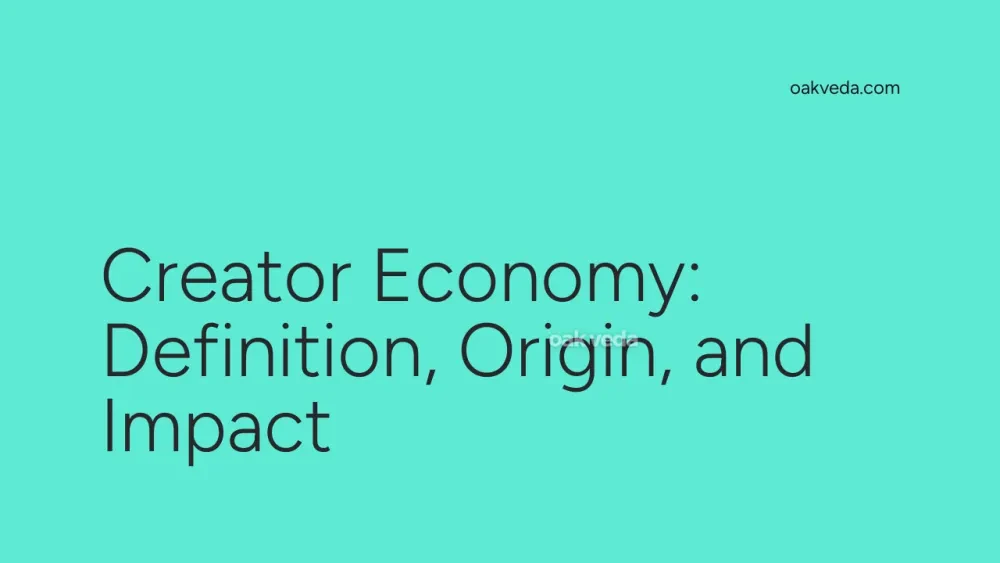
What is the Creator Economy?
The creator economy refers to the rapidly evolving ecosystem that empowers individuals to monetize their creativity, skills, and content through digital platforms. This economic model enables content creators, influencers, artists, and entrepreneurs to build audiences, generate revenue, and establish sustainable careers by leveraging social media, e-commerce tools, and other online platforms.
Origin and Development of the Creator Economy
The creator economy emerged as a natural progression of the digital age, fueled by several key factors:
- Rise of social media platforms
- Democratization of content creation tools
- Shift in consumer behavior towards digital content
- Advancements in mobile technology
- Growth of e-commerce and digital payment systems
The concept gained significant traction in the mid-2010s as platforms like YouTube, Instagram, and Twitch began offering monetization options for creators. The COVID-19 pandemic further accelerated its growth, as more people turned to online content for entertainment and education.
How the Creator Economy Works
The creator economy operates on a simple yet powerful principle: enabling individuals to turn their passions and skills into viable business opportunities. Here's how it typically functions:
- Content Creation: Creators produce original content across various mediums (video, audio, text, images).
- Audience Building: They leverage social media and other platforms to grow their following.
-
Monetization: Creators earn revenue through multiple streams, such as:
- Advertising and sponsorships
- Direct fan support (subscriptions, tips, crowdfunding)
- Digital products and merchandise
- Online courses and workshops
- Affiliate marketing
Types of Creators in the Creator Economy
The creator economy encompasses a diverse range of content creators, including:
- Social media influencers
- YouTubers and vloggers
- Podcasters
- Bloggers and writers
- Digital artists and designers
- Musicians and composers
- Online course creators
- Live streamers
- Niche experts and thought leaders
Popular Examples of Creator Economy Success Stories
- MrBeast: YouTube creator known for elaborate stunts and philanthropy, with multiple successful business ventures.
- Charli D'Amelio: TikTok dancer who leveraged her fame into brand deals, a reality show, and a clothing line.
- Pat Flynn: Blogger and podcaster who built a multi-million dollar business teaching others about online entrepreneurship.
- Kylie Jenner: Influencer who parlayed her social media following into a billion-dollar cosmetics empire.
Impact of the Creator Economy on Social Media Culture
The creator economy has significantly transformed social media culture:
- Shift in aspirations: Many young people now aspire to become content creators as a viable career path.
- Authenticity and relatability: Audiences often prefer content from individual creators over traditional media.
- Niche communities: The creator economy has facilitated the growth of highly specialized interest groups.
- Democratization of influence: It has given voices to previously underrepresented groups and perspectives.
- New marketing paradigms: Brands increasingly collaborate with creators for more authentic and targeted marketing.
Controversies and Debates Surrounding the Creator Economy
While the creator economy offers numerous opportunities, it also faces challenges:
- Income inequality: A small percentage of creators earn the majority of revenue.
- Platform dependence: Creators are vulnerable to changes in platform algorithms and policies.
- Burnout and mental health: The pressure to consistently produce content can lead to stress and exhaustion.
- Content quality concerns: Critics argue that the focus on virality may compromise content quality.
- Ethical considerations: Issues around sponsored content disclosure and the impact on young audiences.
How Brands and Influencers Use the Creator Economy
Brands and influencers have adapted to the creator economy in several ways:
- Influencer marketing: Collaborating with creators for product promotions and brand awareness.
- Co-created products: Developing products in partnership with popular creators.
- Brand-as-creator strategy: Companies producing their own content to engage audiences directly.
- Creator marketplaces: Platforms connecting brands with suitable influencers for collaborations.
- Long-term partnerships: Establishing ongoing relationships with creators as brand ambassadors.
Future Trends in the Creator Economy
The creator economy continues to evolve, with several emerging trends:
- Web3 and blockchain integration: Decentralized platforms and NFTs offering new monetization avenues.
- AI-assisted content creation: Tools to help creators produce and optimize content more efficiently.
- Virtual and augmented reality: Immersive content experiences opening new creative possibilities.
- Creator-led startups: More creators launching their own products and services.
- Micro-niches: Increasingly specialized content catering to highly specific interests.
FAQs about the Creator Economy
-
How much can creators earn in the creator economy? Earnings vary widely, from a few dollars to millions per year, depending on factors like audience size, niche, and monetization strategies.
-
What skills are needed to succeed in the creator economy? Key skills include content creation, marketing, audience engagement, business acumen, and adaptability to platform changes.
-
Is the creator economy sustainable long-term? While challenges exist, the creator economy is likely to continue growing as digital content consumption increases and new technologies emerge.
-
How can beginners start in the creator economy? Start by identifying your niche, consistently creating quality content, engaging with your audience, and exploring various monetization options as you grow.
-
What impact does the creator economy have on traditional industries? It's disrupting traditional media, advertising, and entertainment industries, forcing them to adapt and collaborate with individual creators.
The creator economy represents a significant shift in how content is produced, consumed, and monetized in the digital age. As it continues to evolve, it offers both exciting opportunities and unique challenges for creators, businesses, and platforms alike.
You may be interested in:
- Clickbait: Definition, Origin, and Impact on Social Media
- "I Was Today Years Old": Definition, Origin, and Impact
- Sksksk: Definition, Origin, and Impact on Social Media
- Stock Photos: Definition, Origin, and Impact on Social Media
- Marketing Funnel: Definition, Origin, and Impact
- Access Group: Definition, Origin, and Impact on Social Media

